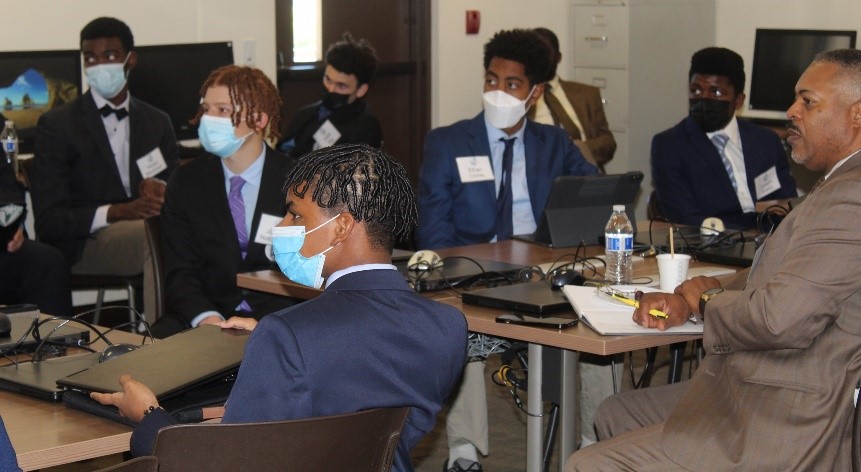On February 26, 2022, the L.A.M.P. Mentor Program had a focus on financial literacy and Historical Legacy. The session started with breakfast and fellowship followed by an Ice Breaker. For the Ice Breaker, Mentor Ramsey Jay, Jr., divided the Mentees into four groups. He gave each group an assignment to draft and later articulate a definition of the acronym L.A.M.P., i.e., Leadership, Achievement, Management and Professionalism. Each group was to use their experiences in the L.A.M.P. Mentor Program as part of their definition. Each group had a Group Leader who was selected at random. The Group Leader had the responsibility of facilitating the conversation and describing in their own words what each letter in L.A.M.P. meant to them. It was quite impressive how well each group handled this critical thinking exercise.
After the Ice Breaker, the Mentees received a two-part presentation on Financial Literacy. Mentor Mark Fowler (a financial advisor by trade) presented the first part. He talked and engaged the Mentees in a discussion about savings, the dangers and benefits of credit cards, the importance of credit ratings, and the benefits of saving now and using compound interest to create a sizable nest-egg in the future. Mentor Fowler explained how credit cards are spending money that you don’t have and how with the interest charges and minimum payments, the item purchased will cost considerably more that had the Mentee saved and paid for the item when he could afford to do so. Mentor Fowler also talked about the ways in which the Mentees will be approached in college by banks and credit card companies to obtain credit card(s) when the Mentees are away from home or just on a college campus. He also created some examples and had the Mentees do the calculations on how much money could result from a steady deposit into a savings vehicle and with the impact of compound interest. The Mentees were quite amazed at the fact that $100 per month starting at age 18 could grow into close to One Million Dollars ($1M) by the time they are 50 years in age.
In the second part of the Financial Literacy Workshop, Mentor Gilbert Holmes provided the Mentees with an Excel Spreadsheet Budget. He had the Mentees determine what their income would be at their first job out of college and walked them through the process of identifying the expenses of life. These included income taxes, housing cost, groceries, cell phones, eating out, car note, tithing for those who will do that, the $100 per month savings investments (mentioned earlier in this article). After adding these cost items to their “budget”, most Mentees were in the red, i.e., had more expenses than income. On top of those expenses, Mentor Holmes then had the Mentees include the payments for their student loans. At that point all the Mentees were in the red. Through this exercise, the Mentees got to see the values and benefit of having a budget, the challenges of living on a salaried income, the choices they will face when they are on their own.

The Mentees found value in the session. Here are two excerpts from a Mentees’ journal entry about the session:
- Excerpt 1 from a 12th Grader: In my reflection of the February 26th L.A.M.P. session I can say that I had fun and learned important skills I will use for the future. The presentation given on finances was interesting to me because I want to protect myself from the pitfalls of having a credit card in the future while also learning how to spend money properly. A key factor of the presentation that I enjoyed was the interactive activity that we did where we took the spreadsheet and tried to fill out how we would properly spend our money. This LAMP session I very much enjoyed.
- Excerpt 2 from a 10th Grader: We also learned financial management a little bit with a practice that Mr. Holmes created for us, and it basically shows us how to manage our money in the future. I found the presentation very interesting.
